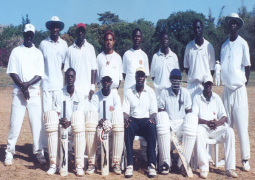A playwright's take on a feminist issue
This is the first published play of The Gambia's leading active playwright Janet Badjan Young, the manageress of Ebunjun Theatre Troupe, who has brought us many lively performances in the past decade including the unbeatable and highly seminal Dance of Kachikally first staged in 2007, and the Battle of Sankandi, in 2002.
The Hand of Fate? explores one of the highly whipped feminist issues: precocious marriages for girls. Sending girls barely out of their teens into the matrimonial bliss has received much criticism from feminists and gender activists of late, as much as female circumcision. The play is therefore, to start with, highly topical and contemporaneous. It is also controversial as it tackles has its proponents in the religious angle, and its detractors.
The Hand of Fate? explores one of the highly whipped feminist issues: precocious marriages for girls. Sending girls barely out of their teens into the matrimonial bliss has received much criticism from feminists and gender activists of late, as much as female circumcision. The play is therefore, to start with, highly topical and contemporaneous. It is also controversial as it tackles has its proponents in the religious angle, and its detractors.
The playwright does not hide her stance: from the onset she shows her abhorrence of early marriage for girls and as the play progresses this leitmotiv gathers momentum. Aminata, the girl child is given into matrimony at a very young age by his dowry craving father, Baba. Sadly, the marriages could not even be consummated before she felt prey to the prowling meningitis bacteria and falls too ill to enter her marriage house. Thus the heavy irony of a calamity like this killer diseases saving her from an uncraved for marriage is indeed poignant.
Irony is just one of the literary effects that Janet employs to devastating impact. She uses flashback, music, song, dance and clever characterization to develop and expound on the plot. Therefore, in addition to the good story, and excellent stage movements the play also is rich in dramatic effects that make good dramas.
This play is highly militant. It tackles an issues which the playwright detests and believes strongly that it should be condemned to the trash tip so as to give girls an equal chance to prove themselves in education and careers. This play and her previous and unpublished ones on AIDS and child rights, has a moral to it just as the fables of Aesop or Soyinka's Lion and the Jewel.
As an accomplished actress and speech expert herself, Janet allows the monologues and dialogues to tell the story, just as much as the dancing and songs and stage sets. This is dramatic efficiency at its apotheosis.
This is an excellent piece of drama. It makes us proud as Janet is treading the footsteps of earlier Gambian women dramatists like Rosamond Fowlis and Lady Augustus Jawara, who in the middle decades of the last century entertained and educated Gambian through this medium of the play.
This play is highly recommended for schools, where there is the need to encourage drama as its helps to cultivate the arts of public speech, which is the basis for building self confidence among pupils, especially girls.
Available at Timbooktoo 4494345.
Read Other Articles In Article (Archive)

Deyda Hydara Murder Investigation in Progress -Security Council
May 13, 2008, 6:09 AM



